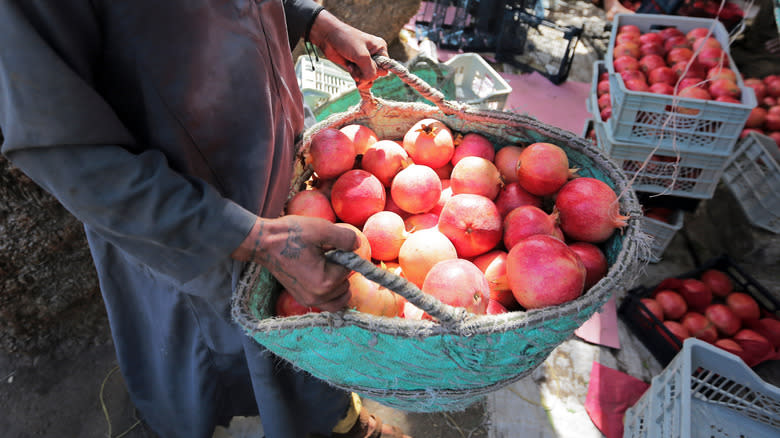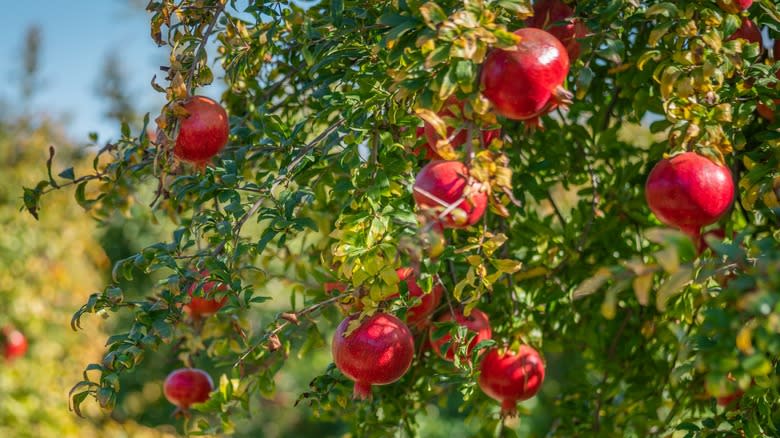Why Azerbaijan Gives Such High Praise To The Humble Pomegranate

The pomegranate is one of the oldest fruits in the world, and in the region where it first originated, the ruby red ripper remains a big deal. Pomegranate shrubs are historically indigenous to the Middle East, particularly Iran, northern India, Turkey, and Armenia, and today they span from the West Mediterranean to East China. But, in Azerbaijan, the pomegranate totes the high honor of being the country's national symbol.
Due to its ideal natural climate, Azerbaijan hosts the perfect agricultural setting for growing more than 60 different varieties of pomegranates (aka nar). In 2022 alone, Azerbaijan produced 187,000 tons of pomegranates, only 15% of which were exported abroad. Common local varieties include Goychay, Veles, Gyuleysha, and Shandi. To foodies in Azerbaijan, the pomegranate is known as the "king of fruit," a regal moniker earned for the crown-like plume of sepals that sprout from the fruit's top center. In local cuisine, it's used in both sweet and savory applications, made into jams, sauces, sorbet, dumplings, salads, and stews.
Narnumru is a regional dish made from serving a fried egg over a bed of pomegranate seeds and sautéed onions. The tangy seeds (arils) are often added to richer meat-centric dishes to balance the heaviness of the entrée. In nargovurma, chunks of meat are stewed with chestnuts, onions, and pomegranate, and served over bread or rice. The juice is also sipped, the seeds are added to tea, and many rural foodies in Azerbaijan ferment their pomegranates into magenta-hued wine.
Read more: 13 Simple Tricks To Pick The Best Fresh Fruit Every Time
Symbolically, The Pomegranate Holds A Lot More Than Just Seeds

Aside from entrées, the pomegranate's more luxurious uses are not to be overlooked. Narsharab is a molasses-esque syrup that's commonly used to dress fried fish. Nardancha is a sweet pomegranate jam unique to the Goychay region -- which is also home to the country's annual Pomegranate Festival, Nar Bayrami.
The festival occurs around late October, in the middle of the pomegranate's growing season, which lasts from September to February. Nar Bayrami began in 2006 and has since exploded into a two-day celebration that draws tens of thousands of locals and out-of-town visitors alike for events like the "largest pomegranate contest" and a beauty competition for the title of "pomegranate girl."
In Azerbaijani culture, the pomegranate is a widely known symbol of love, passion, fertility, wealth, abundance, and unity. Before it became socially acceptable in the country to profess your love for another person through speech, proto-sweethearts used to give each other pomegranates to reveal their true feelings. Today, the fruit continues to serve a significant role on holidays and events like New Year's and weddings as a symbol of prosperity.
Inspiring Generations Of Artists - And Feeding Them, Too

In many ways, the pomegranate is a cultural icon that inspires local artists and writers and has played an important role in shaping Azerbaijan's national identity. The fruit has emerged as something of a muse to Azerbaijani artists. There's a pomegranate tree in the fresco of the 18th-century Sheki Khan Palace, which was commissioned by the third Khan of Sheki, Muhammad Husayn Khan Mushtaq, who held the palace as his dominion's capital.
Khalil Gibran -- the poet-pioneer of the Romantic Arabic literary movement of the early 1900s who was born in nearby Lebanon -- famously penned the poem "The Pomegranate," a personified fable-meets-ode celebrating the fruit as a sacred and animated vessel for divinity and realized self-actualization. Prominent poets Mehmed bin Süleyman Fuzuli and Nizami Ganjavi have also immortalized the king of fruit in verse.
Pomegranates have been used in Azerbaijani crafts, visual art, storytelling, myths, textile-dying, and jewelry-making for centuries. To try a taste of this ruby-rich history for yourself, the seeds would make a flavorful, sophisticated snack at your next wine-tasting party. (You can use the pomegranate's peel, too!)
Read the original article on Tasting Table.


